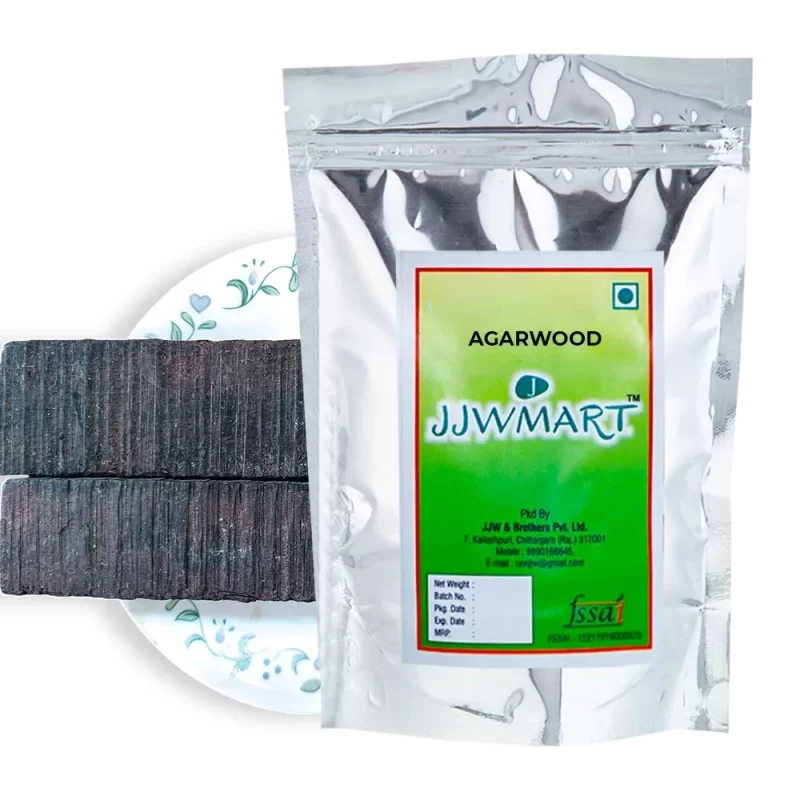Ayurvedic products and herbs
5 Amazing Health benefits of Agarwood
Agarwood extract, often known as Oud, is one of the most valuable products of the protective resin of the Agarwood tree. Lord Krishna, the God of Protection in India, is said to enjoy its perfume, while Buddha declared that burning Agarwood gives the “scent of Nirvana.” Agarwood trees are endemic to Assam, Arunachal Pradesh, Nagaland, Manipur, Mizoram, Tripura, and Meghalaya in India’s northeast. Agarwood, also known as aloeswood, eaglewood, or gharuwood, is a black resinous wood that is used in incense, perfume, and miniature sculptures. When aquilaria trees become infested with a sort of mould, it forms in the heartwood (Phialophora parasitica). Prior to infection, the heartwood is odourless, light, and pale in colour; however, as the infection progresses, the tree produces a dark aromatic resin called aloes (not to be confused with Aloe ferox, the succulent commonly known as the bitter aloe) or agar (not to be confused with the edible, algae-derived agar), as well as gaharu, jinko, oud, or oodh aguru (not to In Indian-North Eastern tradition, the resin-embedded wood is prized for its particular aroma, and it is used to make incense and fragrances.
Contents
Agarwood in Ayurveda
Agaru, also known as Aloe wood or Agarwood, is an evergreen shrub. It has a strong odour and a harsh taste. Because of its anti-inflammatory properties, this plant is beneficial in treating rheumatoid arthritis by lowering pain and inflammation. Because of its Vata balancing function, Ayurveda claims that frequent oil massage on the joints might help you get rid of joint discomfort. Due to its Ushna (hot) potency and Kapha balancing characteristics, it also aids in the removal of excess mucus from the respiratory system and the management of bronchitis. It protects the liver from free radical damage because of its antioxidant properties, and it also lowers inflammation in the liver due to its anti-inflammatory properties. Because of its therapeutic properties, applying its oil to the skin helps to control skin diseases including eczema. Agilawood, Agarwood, Agilawood, Agar is the Hindi name for Agarwood, Agaru is the Bengali name, Agar: Gujarati name, Agalichandanam, Aggalichandanam are Tamil names for the same thing, while Agaru is a Telugu name, Akil is a Malayalam name, Pravara, Anaryaka, Vamshika, Vishvaroopakam, Rajarha, Shreshta Vruksha, Krumija, Jongakam, and Krumija Loha are some of its Sanskrit synonyms. It is black and heavy, akin to iron.
Top 5 Health Benefits of Agarwood
Agarwood extract, which is high in antioxidants and anti-inflammatory qualities, is used as a skin tonic to nourish skin while also fighting and repairing damage. Agarwood is also used as a therapeutic agent for the body and mind in many Eastern treatments. It mostly balances the Kapha and Vata Doshas. When applied to the skin, it is most effective in alleviating coldness. Here are top 5 health benefits of agarwood
Treats Urticaria:
For the treatment of Urticaria, mix 2 grams of agaru powder with 5 cc cow’s ghee. It helps to cure urticaria by having an anti-allergic and anti-pruritic effect on the skin. It also relieves itching and raised itchy bumps caused by urticaria. Its powder is often applied to the skin in a mixture with coconut oil to relieve itchy and burning sensations.
Reduces numbness and tingling:
Tingling feelings can develop in any area of the body, indicating a disruption in the Vata dosha equilibrium in the body, according to Ayurveda. Tingling and numbness are lessened as the Vata dosha is balanced.
Read More: Health benefits of Brahmi
Controls Enuresis:
Enuresis is a condition in which a person is (Bedwetting). Agaru is a nervine tonic that strengthens the nerves and the urine bladder. It also gives the urinary bladder the power it needs to contain urine generated during the night. It also addresses bladder reactivity, which is a typical cause of enuresis. It is effective in the treatment of bedwetting.
Improves bloating, gas in the intestines and abdominal distension:
Agaru is used in Ayurveda to relieve bloating and stomach distension, and it has been used with Cumin Seeds (Jeera) and Carom Seeds (Ajwain) for many years. Its primary role in the digestive system is to relieve abdominal spasms and discomfort caused by excessive gas in the stomach.
Appetite Suppression:
By working on the stomach and liver, Agaru increases hunger. It boosts the liver’s metabolism and enhances its performance. It also boosts digestive power by improving gastric secretions.
Read More: 5 Ayurvedic Practices for Maintaining a Healthy Liver
Conclusion:
Krumihara is beneficial in the treatment of worm infections and infected wounds. Anilahara is a technique for balancing the Vata dosha in the body. Kushtahara is beneficial for skin problems. Kaphahara relieves sputum and is beneficial for colds, coughs, and asthma. Dushta Vranashodhana is beneficial for wound healing. Rasa is a word that is used to describe (Taste), Katu (bitter) and tikta (bitter) (Pungent), Ruksha (Dry), Tikshna (Sharp), and Laghu (Light), Virya (Quality) (Potency), Ushna & Ushna & Ushna (Hot), Vipaka Vipaka Vipaka Vipaka Vi (Resultant), Katu – (undergoes pungent after digestion), Karma of the dosha (Effect on doshas).
For more details on herbs & its remedies realted educational videos subscribe to our channels
https://www.youtube.com/@trustherb
https://www.instagram.com/trustherb.india/


